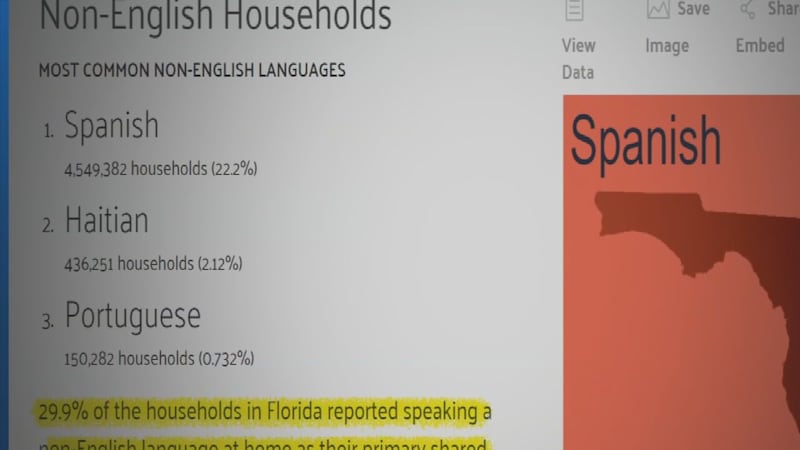ORLANDO, Fla. — Florida is known for being the home to a large Hispanic and Latino population.
▶ WATCH CHANNEL 9 EYEWITNESS NEWS
Many of them are not native English speakers, and that makes Spanish the second most spoken language in Florida.
However, Spanish is just one of many other languages woven within the diverse linguistic fabric of the Sunshine State, and for families in bilingual households, there is a different routine when it’s time to go back to the classroom.
The Batista family is an example of one such family.
Read: Crabby Joe’s restaurant reopens nearly 2 years after Hurricane Ian
“Since they were born, it was my husband and my decision to talk in Portuguese with them because we wanted them to learn the language,” said Denise Batista, the mother of Brian and Kevin, who are eight and ten years old, respectively. “English is going to be the primary language, but we always thought that it would be great if they could speak both languages.”
Denise Batista, who was born and raised in Brazil, moved to the U.S. in her early 20s.
From personal experience, she knows the importance of knowing a second language.
“I think it’s a victory,” said Batista. “I think they’re going to have better chances in the future because they can communicate in both languages. I always tell them that my friends who speak two languages fluently make more money. So, they’re super excited about that.”
Read: COVID surge: What is KP.3.1.1, its signs, symptoms
The Batista household is one of the hundreds of thousands in Florida, and it has a non-English shared language.
According to the 2022 census, nearly 30% of the households in Florida reported speaking a different primary language.
That number is almost 10% higher than the national average - making Florida one of the states with the most bilingual households in the country.
“All over the world, there are many children who are learning more than one language at a time. And this is something that children do very beautifully,” said Dr. Katrina Stone, Licensed Psychologist with Lighthouse Psychology in Orlando. “There’s some research that suggests that being bilingual helps you to be more flexible cognitively. There is also some research that suggests you have that foundation, and it makes it easier for you to learn a third language on top of what you already know.”
Dr. Stone also debunked an old myth about speaking different languages at home – learning a second language is not going to take away from the other subject’s children need to learn at school.
Read: Hurricane Ernesto passes near Canada; remnants expected to affect parts of Europe
“Sometimes families will come, and they know their child’s going to be learning in English, and they’ll think, ‘I only need to speak English to my child so they’re prepared for school.’ But what that takes away is the ability to have that conversation in a home language about conceptual ideas and understanding,” said Stone.
The expert said consistency is crucial – the more exposed the child is to different languages, the easier it will be for the child to communicate, something Denise Batista also agrees with.
“When my parents visit, they know to only talk with them in Portuguese,” said Batista. “They’re super good. They are growing up to be A and B students, and I’m very proud of them.”
Doctor Stone also explained that the younger your child is, the better when it comes to implementing a new language, even if the parent is not necessarily bilingual.
“It is really important to remember you’re giving your child a huge gift by giving them the gift of a second language,” said Stone.
Click here to download our free news, weather and smart TV apps. And click here to stream Channel 9 Eyewitness News live.
©2024 Cox Media Group






